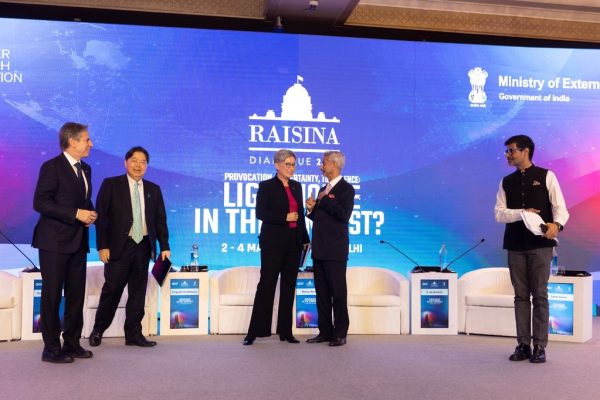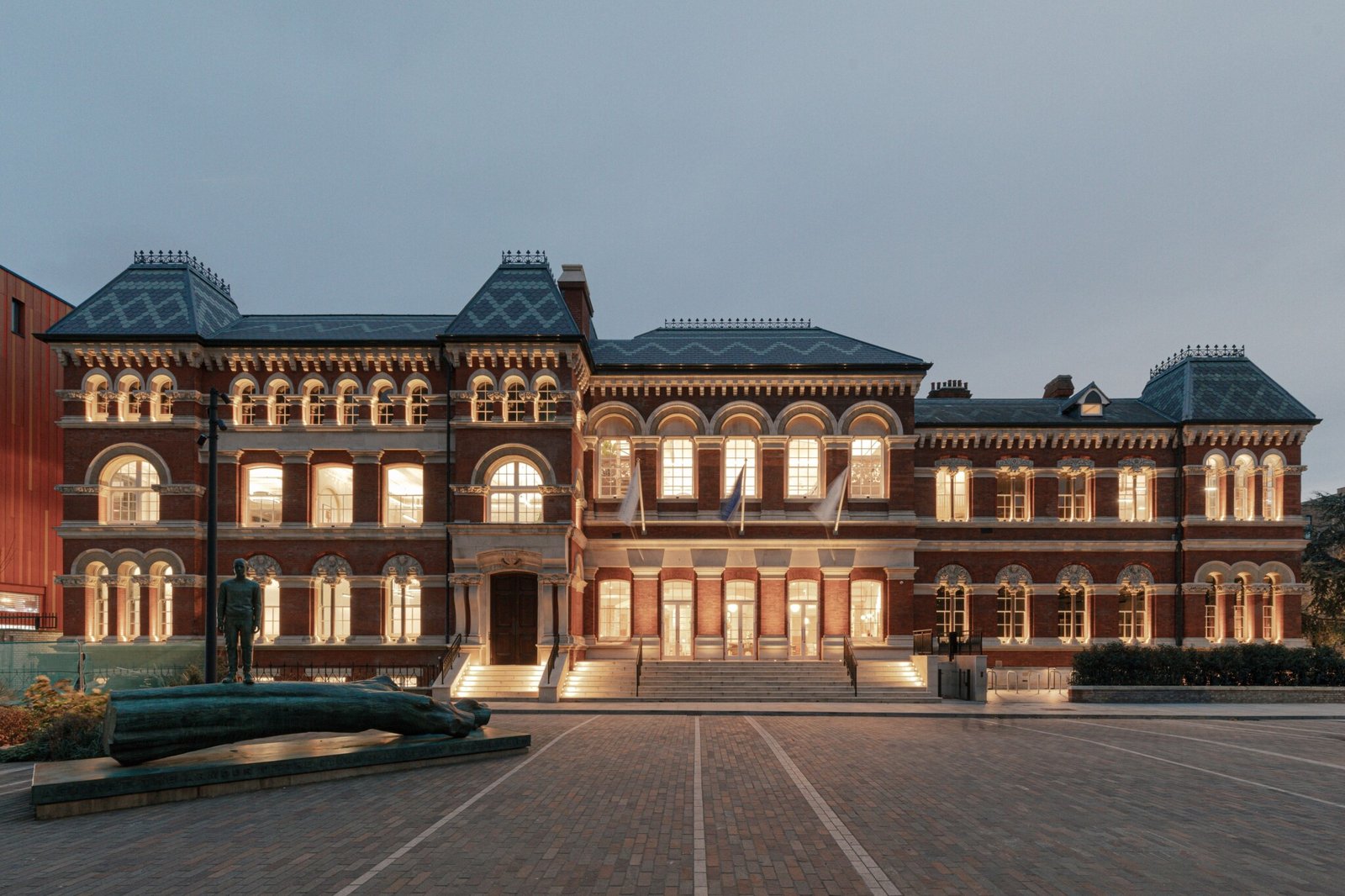India has arrived: This was the subtle if clear message from the recently concluded Raisina Dialogue hosted by the Indian External Affairs Ministry in New Delhi, held immediately after the G-20 foreign ministers’ meeting. A stellar lineup of speakers, panelists, and participants included Italian Prime Minister Giorgia Meloni, EU Foreign Minister Josep Borrell, the foreign ministers of the four Quad states (Australia, India, Japan, and the United States), former British Prime Minister Tony Blair, and the foreign ministers of Mexico, Indonesia, Brazil, and South Africa (among others).
In many ways, Raisina was more diverse and more representative of the world at large than the Munich Security Conference held earlier in January.
The diversity also extended to the themes covered in its approximately 50 panels (many in parallel sessions) covering the Quad and Asian security, food security, counterterrorism, liberalism and democracy, U.S. political divides, the state of the Middle East, the debt crisis, various aspects of technology in international relations, climate change, and other issues. Two overarching topics, however, defined the event – multilateralism and the concerns of the Global South, and countering China in Asia and elsewhere, with the Ukraine war cropping up in several of the discussions.
The first theme, a focus on the Global South, should not be surprising. India is this year’s chair of the G-20, practically the only viable multilateral forum still functional after the paralysis of the U.N. Security Council in the wake of Russia’s invasion of Ukraine. New Delhi has made it clear that it plans to highlight the priorities of the Global South during its tenure as chair. This means raising its own voice, but also those of African, Latin American, and developing Asian states. India has a history of speaking for the Global South ever since independence, as founder-member of the Nonaligned Movement.
Apart from Indian External Affairs Minister S. Jaishankar, four other ministers were key voices of the Global South at the event – Mauro Vieira of Brazil, Marcelo Ebrard of Mexico, Naledi Pandor of South Africa, and Mohammad Shahriar Alam of Bangladesh. Ebrard strongly pitched insulating Ukraine and other geopolitical crises from the developmental work of the G-20, where consensus is easier. Alam criticized wealthier states for not meeting their climate and foreign aid commitments. He highlighted the Myanmar crisis, opposing sanctions against the country, but calling for targeting Western corporations who do business with the junta. Vieira called for a diverse and empowered group of wealthier and developing states to tackle the climate crisis. Pandor pushed for a global stimulus package for the poorest countries, especially in Africa.
On the Asian continent, the Global South is represented by South and Southeast Asia. Although the debt crisis is less relevant to the region (except states such as Pakistan and Sri Lanka), climate change is a looming threat, food security is not guaranteed, and an enormous mismatch exists in terms of the more than 2 billion inhabitants of developing Asia and their economic growth story and their voice and votes in international institutions. Global South speakers and panelists, such as former Ambassador Lakshmi Puri from India, repeatedly emphasized the need for major reform of the U.N. system to correct this imbalance.
The war in Ukraine made its presence strongly felt at Raisina, but in differentiated ways. Western panelists brought up and condemned the Russian invasion at every opportunity, including in panels that had little to do with security. Josep Borrell sharply criticized Russia, portraying its invasion of Ukraine as the core challenge to the global order, and demanding global unity against Moscow.
Panelists from the Global South were conspicuous in their refusal to blame Russia, though some deplored the war’s impact on their countries’ economies. For instance, Ghana’s Information Minister Kojo Nkrumah emphasized that climate change, the debt crisis, and threats from non-state actors were the biggest challenges facing West Africa, implicitly de-centering U.S. and European views of the Ukraine crisis.
In this context, Russian Foreign Minister Sergei Lavrov’s 30-minute interview, during which he sometimes butted heads with his interviewer, was notable for the polarized reactions in the audience. Some Indian viewers cheered some of his remarks, while most audience members from Europe or North America scowled and occasionally jeered. Lavrov’s claim that Russia was acting in self-defense against a war started by Ukraine, however, drew derisive laughter from most in the audience.
The other centerpiece of the event was the Quad foreign minister’s meeting, which issued a joint statement, and a panel in which all four ministers – Blinken, Hayashi, Jaishankar, and Wong – participated. The joint statement reiterated staple themes in recent such U.S. and Quad pronouncements – a free and open Indo-Pacific, support of the rules-based order, freedom of navigation, opposition to the unilateral changes in the status quo, ASEAN centrality, and others. Predictably, China was not named, but several of the references were clearly aimed at Beijing. New elements in the joint statement included a working group on counterterror (a major Indian priority), clearer support for U.N. reform, and collaboration with the Indian Ocean Rim Association, a regional grouping of littoral states (which includes U.S. adversary Iran.)
The panel discussion gave further glimpses of the attitudes of the four states. Jaishankar reiterated that the Quad stood “for something, and not against something or someone.” Blinken stated that the Quad was not a military or security pact and was focused on providing public goods to the region. The U.S. secretary of state insisted, as he has done before, that the Quad will not force states to choose but “offer a choice.” Australia’s Wong remarked that the grouping, if anything, enhances ASEAN centrality.
Hayashi, interestingly, spoke of the Quad being an open architecture. There was a hint in the Japanese minister’s remarks that China could participate in some undefined manner if it abided by the rules of the road.
It is clear, however, that the Quad’s very existence is aimed to counter and exclude China in its activities. An even sharper interpretation is that the Quad is trying to create facts on the ground that could end up bifurcating the region into pro-Quad and a pro-China states. The Quad can only achieve this, if this is indeed its intent, by decentering ASEAN. This might explain why not a single Southeast Asian state has expressed interest in joining the Quad.
It is true that the Quad has delivered, if belatedly, on its vaccine shipments. But as far as the other slew of public goods mentioned – climate, infrastructure, technology, and others – there has been more talk than action. An important exception is the Quad’s military dimension – though not owned up to by the grouping officially – in the form of the increasingly sophisticated annual Malabar exercise by the same four states. The Quad’s more recent maritime domain awareness initiative, officially a part of the grouping’s activities, will be useful to counter illegal fishing, but could also be deployed for military purposes.
Taiwan was the focus of a panel featuring European, Indian, and Southeast Asian participants, including former Indian Ambassador Sujan Chinoy and former Swedish Foreign Minister Carl Bildt. European participants largely operated from the assumption that China was likely to attack Taiwan, though Slovenia’s Danilo Turk called for not enabling a self-fulfilling prophecy. The overall mood of the conference, however, was a deep distrust of China – which was also reflected in the minimal participation from that country.
With its deepening partnership with the United States and its core allies on full display along with its claim to be speaking for the Global South, the conference revealed India to be rather adept in playing the field. India may be aiming to be a bridge player between the South and the North, thereby deriving maximum benefits for its interests.
In a world of greater complexity and fluidity, expect more actors in Asia and elsewhere to take on seemingly contradictory roles. Washington will need to abandon its instinctive urge to see states as friends or foes if it is to remain influential in the evolving Asian and global order.





















Discussion about this post